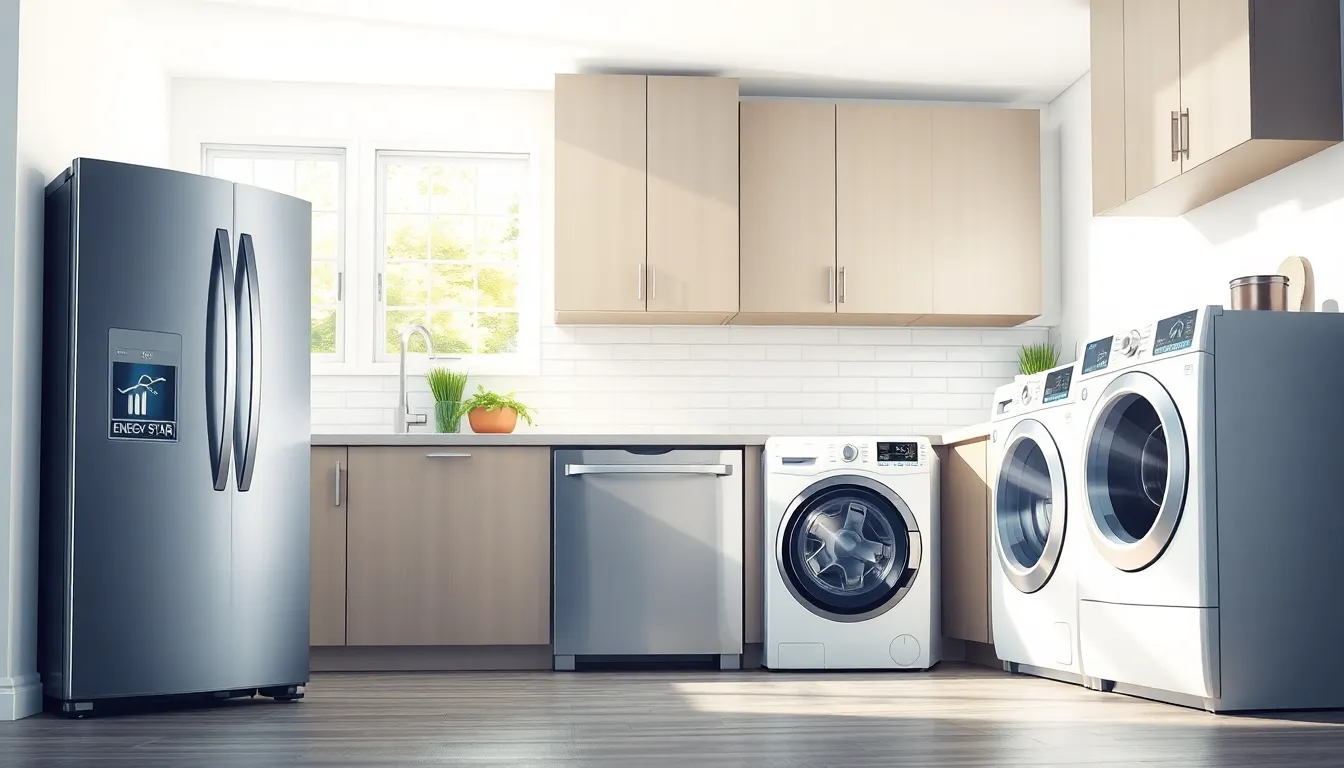Table of Contents
ToggleIn a world where energy bills can feel like a second mortgage, energy-efficient appliances are like the superheroes of home management. They swoop in to save the day, cutting costs while saving the planet—no cape required. Imagine your washing machine running on less energy than your favorite coffee maker; it’s not science fiction, it’s just smart living!
Switching to energy-efficient appliances isn’t just good for your wallet; it’s also a great conversation starter at dinner parties. “Oh, this? It’s just my eco-friendly fridge saving me a small fortune while keeping my kale fresh.” Who knew saving the planet could come with such a side of sass? Dive into the world of energy-efficient appliances and discover how they can transform your home into a green oasis—without sacrificing style or comfort.
Overview of Energy-Efficient Appliances
Energy-efficient appliances perform tasks while consuming less electricity and water than standard models. Various appliances, including refrigerators, washing machines, and dishwashers, showcase energy-saving technologies. These devices often feature advanced compressors and optimized cycles that enhance performance and reduce resource usage.
Energy Star certification identifies appliances that meet strict efficiency guidelines set by the U.S. Environmental Protection Agency. Such certification indicates that purchasing these appliances can lead to lower utility bills. Owners can save up to 30% on energy costs by choosing Energy Star-rated products.
Innovative technologies also contribute to the efficiency of these appliances. Smart features allow users to monitor and control devices remotely. This connectivity encourages optimal usage patterns, further decreasing energy consumption.
Many consumers appreciate the long-term savings associated with energy-efficient appliances. While the initial purchase price may exceed that of traditional appliances, savings on utility bills quickly offset that cost. Research shows that households can save hundreds of dollars annually through smart appliance choices.
Environmental benefits also come from energy-efficient appliances. Using less electricity results in a lower carbon footprint, contributing to sustainability efforts. Many consumers feel a sense of pride in choosing appliances that align with eco-friendly values.
Energy-efficient appliances offer numerous advantages, from decreased utility bills to enhanced environmental responsibility. Embracing this technology not only improves home management but also aligns with broader efforts toward sustainability.
Benefits of Energy-Efficient Appliances

Energy-efficient appliances significantly enhance modern home management by offering numerous advantages. Among the most compelling benefits, cost savings stand out for many households.
Cost Savings
Cost savings arise from reduced energy and water usage. Energy Star-rated appliances can lower utility bills by up to 30%. For instance, a modern washing machine may use 15 gallons of water per load compared to 40 gallons for older models. Long-term, homeowners often save hundreds of dollars each year linked to the efficient operation of these appliances. While upfront costs may differ, the financial benefits accumulated over time make these investments worthwhile.
Environmental Impact
Environmental impact emerges as another vital consideration. Energy-efficient appliances reduce electricity demand, lowering greenhouse gas emissions. They also conserve water, contributing to sustainable resource management. A single efficient refrigerator can save approximately 100 kilowatt-hours annually. The use of such appliances supports eco-friendly living, enhancing consumer alignment with sustainability values while fostering a healthier planet for future generations.
Types of Energy-Efficient Appliances
Energy-efficient appliances come in various categories, each designed to optimize energy usage and reduce utility costs. These categories include kitchen appliances, laundry appliances, and HVAC systems, all focused on improving performance while minimizing resource consumption.
Kitchen Appliances
Energy-efficient kitchen appliances significantly lower electricity and water usage. Refrigerators often feature improved insulation and compressors for efficient cooling, while modern dishwashers can clean dishes using as little as 3 gallons of water per cycle. Microwaves and ovens with smart technology enable users to manage cooking times and temperatures effectively, enhancing energy savings. Choosing Energy Star-certified models ensures more eco-friendly options. This smart selection reduces the overall carbon footprint while contributing to a sustainable kitchen environment.
Laundry Appliances
Energy-efficient laundry appliances play a vital role in conserving water and power. Newer washing machines consume only 15 gallons per load, in contrast to older models that require 40 gallons. These appliances often use advanced spin technology, extracting more water during the wash cycle, thus cutting drying times. Energy-efficient dryers provide moisture sensors, preventing over-drying and saving energy. With the potential for considerable annual savings, investing in efficient laundry appliances makes both economic and environmental sense.
HVAC Systems
Energy-efficient HVAC systems help maintain comfortable indoor environments while minimizing energy consumption. These systems utilize advanced technologies such as variable-speed compressors and smart thermostats, allowing for tailored heating and cooling. SEER (Seasonal Energy Efficiency Ratio) ratings indicate the system’s efficiency, with higher ratings representing greater energy savings. Regular maintenance of these systems enhances performance and extends their lifespan. Upgrading to an energy-efficient HVAC solution leads to considerable utility savings, ensuring affordable year-round comfort.
Considerations When Choosing Energy-Efficient Appliances
Selecting energy-efficient appliances requires attention to certain key factors. Understanding energy ratings and certifications can greatly enhance informed choices.
Energy Ratings and Certifications
Energy ratings indicate how efficiently an appliance operates. The Energy Star certification serves as a reliable benchmark, recognizing products that meet strict efficiency standards. Appliances that earn this label typically consume 10% to 50% less energy than their non-certified counterparts. Additionally, consumers can review the federal EnergyGuide label, which compares the energy use of similar models. Using these ratings provides insight into potential savings on utility bills and environmental impact.
Initial Cost vs. Long-Term Savings
Initial costs of energy-efficient appliances often exceed those of standard models. This higher expense, however, leads to significant savings over time. Households can save hundreds of dollars annually through reduced utility bills, especially when considering the lower energy usage of efficient models. For example, switching to an Energy Star washing machine can cut water usage from 40 gallons to as low as 15 gallons per load. Evaluating these products through the lens of long-term savings may reveal they are economically advantageous despite the upfront investment.
Investing in energy-efficient appliances not only leads to significant savings on utility bills but also supports a sustainable lifestyle. These appliances are designed to use less energy and water while providing optimal performance. By choosing Energy Star-certified products, consumers can ensure they’re making environmentally responsible decisions.
The initial investment may be higher but the long-term financial and ecological benefits make it worthwhile. As households adopt these modern solutions, they contribute to a healthier planet and promote eco-friendly living. Embracing energy-efficient appliances is a smart choice that aligns with both economic and environmental goals.




